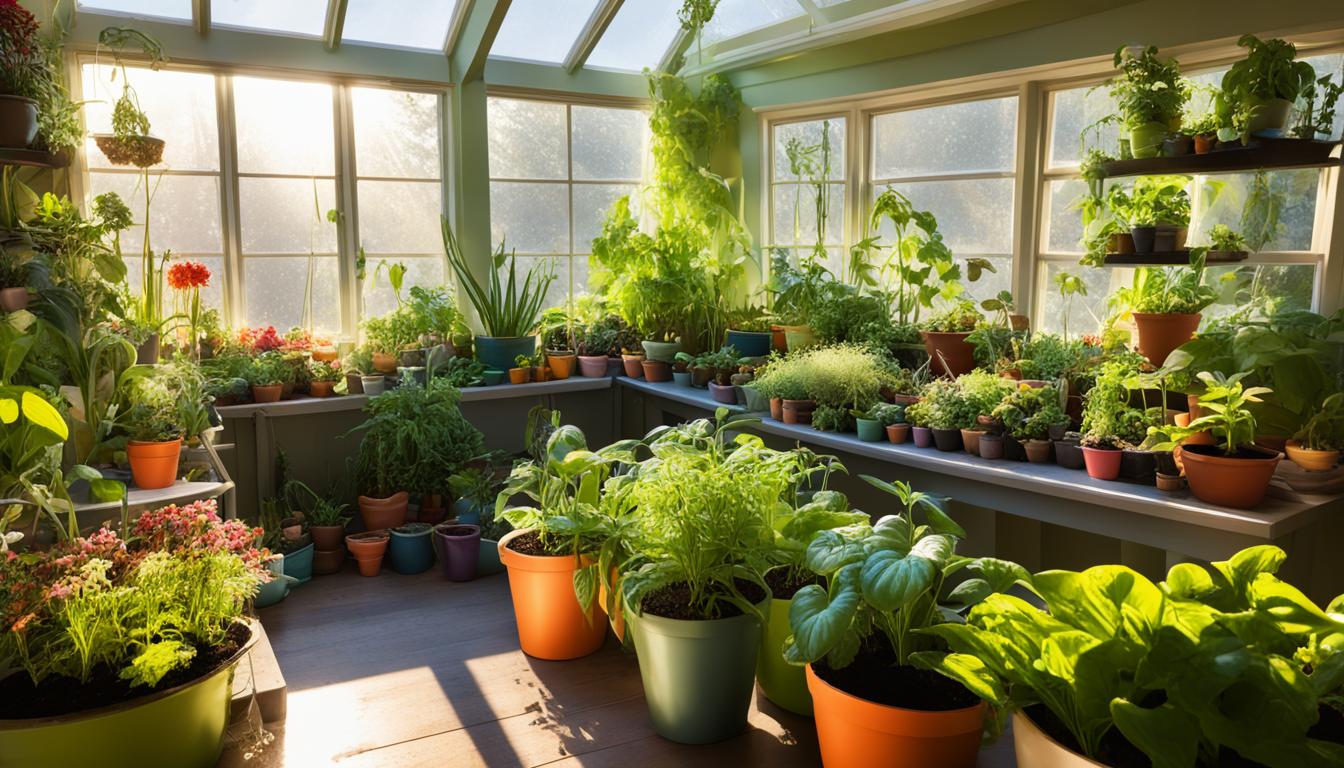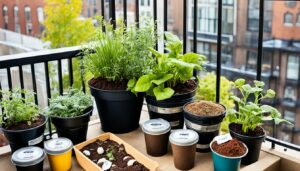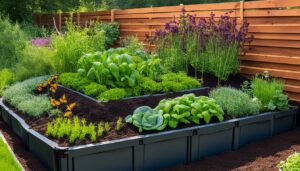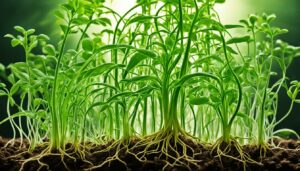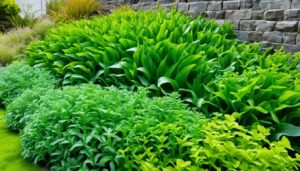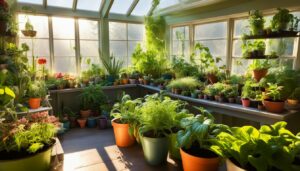One sunny afternoon in Southern California, Lisa decided to pamper her indoor plants. Her potted herbs and succulents were thriving due to her organic care. However, she noticed some of them looking dull and stunted. It was clearly time to refresh the soil.
Lisa preferred to rejuvenate old pot__))
Adding compost and worm castings meant Lisa could skip other drainage materials like perlite. The results were impressive. In weeks, her plants looked healthier, with thicker, greener leaves. This success showed the power of keeping soil healthy through eco-friendly methods.
Key Takeaways
- Using compost and worm castings helps rejuvenate old potting soil.
- These organic amendments provide essential nutrients to indoor container plants.
- Amending soil reduces the need for additional drainage components like perlite.
- A recommended mixing ratio is 1 part compost to 3 parts potting soil.
- Pathogen-free old potting soil can improve garden beds’ texture and drainage when added.
- Revitalized soil promotes healthier plant growth and resilience.
The Benefits of Using Compost for Indoor Plants
Adding compost to indoor plants helps them grow strong and healthy. It makes the soil better and gives the plants vital nutrients. Compost also brings good tiny life forms to the earth.
Improving Soil Structure
Compost keeps the soil light and airy. This is key for the plants in pots, as they can’t spread their roots far. Stuff like perlite and peat moss in compost helps too.
Providing Essential Nutrients
Compost feeds plants important food as it breaks down. This keeps the plants growing well. It’s a top way to garden sustainably indoors.
Supporting Beneficial Microorganisms
Compost helps good bugs that make the soil rich. These bugs help plants get food and fight off sickness. It’s great for helping house plants deal with tough inside spots.
How Worm Castings Benefit Indoor Container Plants
Worm castings, called “black gold” by those who love gardening, are great for your indoor plants. They improve soil aeration, keep water in the soil, fight off plant diseases, and help plants grow better. These benefits make worm castings a must-have for growing plants organically.
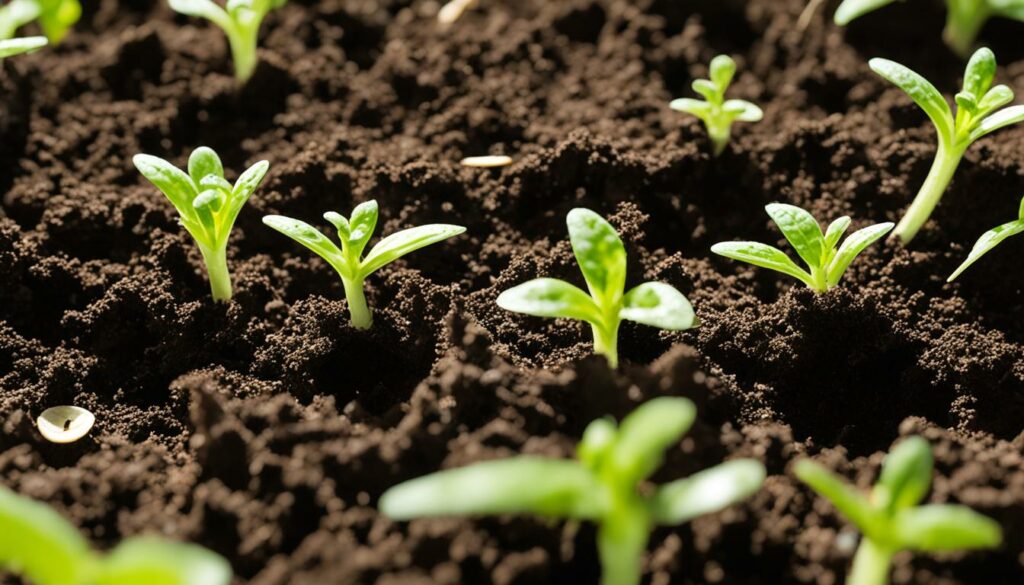
Enhancing Soil Aeration and Water Retention
Worm castings make the soil better at holding air and water. This leads to stronger roots and healthier plant growth. When you mix them with your potting soil, they keep the soil just right. This ensures plants’ roots get enough oxygen and water.
Suppressing Plant Diseases and Pests
Worm castings are amazing at keeping pests away naturally. Research from big schools like The Ohio State University and Cornell University show they stop many pests and diseases. They keep seeds and young plants safe from mold without using harmful chemicals.
Boosting Plant Growth and Flowering
Worm castings slowly release nutrients that plants need to stay healthy and grow. This helps your plants bloom more and stay vibrant. Adding worm castings to your indoor garden will make your plants look better and live happier.
How to Use Compost and Worm Castings to Rejuvenate Soil in Indoor Container PlantsBefore you begin, gather your materials for mixing. Combine 1 part compost with 3 parts of the old potting soil. This mix spreads nutrients evenly and keeps the soil healthy.
Removing any diseased soil that could pose a risk to plant health is a necessary step in this process.
Add worm castings to boost the soil’s fertility if you can. Worm castings improve aeration and how water is held in the soil. Together, they boost your plants’ growing space.Now, it’s time to repot your plants with this new soil mix. This gives your plants fresh nutrients for better growth. Make sure the old soil mixes well with your amendments. It’s crucial for even nutrient distribution.Using compost and worm castings for repotting will make your indoor plants thrive. It creates a strong and healthy environment for them to grow.Steps to Refresh Old Potting SoilReviving old potting soil is key for plant health. Follow these easy steps for a successful soil refresh.
FAQ
What are the benefits of using compost in indoor container plants?
Compost makes soil better, gives plants important food, and helps good bugs that keep soil and plants healthy.
How does compost enhance soil structure in indoor gardening?
Compost keeps soil light and helps water flow well. This stops soil from getting hard and helps roots grow strong.
What essential nutrients does compost provide to indoor plants?
Compost gives plants key nutrients like nitrogen, phosphorus, and potassium. Plants need these for health and growth.
How do beneficial microorganisms in compost support plant health?
Good bugs in compost make soil fertile and shield plants from sickness. They build a healthy environment for plants to thrive.
How do worm castings benefit indoor container plants?
Worm castings make soil better for air and water, stop diseases and bugs, and give plants long-lasting food for growth and blooms.
How do worm castings enhance soil aeration and water retention?
Worm castings add tiny holes in the soil, boosting air and water hold. This leads to stronger plants and root systems.
How do worm castings help in suppressing plant diseases and pests?
Research from The Ohio State University and Cornell University shows worm castings fight off many plant diseases and pests, like mites and aphids. They also keep seeds and little plants safe from fungus.
How does the use of compost and worm castings rejuvenate soil for indoor container plants?
Mixing compost with old soil and adding worm castings refreshes the earth. It gives back nutrients, betters soil feel, and boosts bug life, helping plants flourish.
What is the recommended ratio for mixing compost into old potting soil?
Use 1 part compost and 3 parts old soil. This mix restores the soil well.
How can I ensure proper drainage and aeration when refreshing old potting soil?
Add perlite to your soil mix. It helps keep the soil loose for water and air to move freely, aiding root health.
Can old potting soil be used in garden beds?
Yes, you can use old, disease-free potting soil in garden beds. It improves soil feel and drainage.
| Benefit | Description |
|---|---|
| Enhanced Soil Aeration | Improves root oxygenation, aiding better root system development. |
| Water Retention | Maintains soil moisture, crucial for indoor plant health. |
| Natural Pest Suppression | Inhibits pests like mites, aphids, and mealybugs, reducing the need for chemical treatments. |
| Disease Suppression | Protects plants from fungal infections, boosting overall health. |
| Nutrient Release | Slow-release of nutrients promotes sustained plant growth and flowering. |
| Steps | Benefits |
| Mix compost (1 part) with old potting soil (3 parts) | Balances nutrients |
| Add worm castings if available | Enhances fertility and soil structure |
| Check soil for hydrophobic properties | Ensures proper nutrient integration |
| Repot plants with refreshed soil | Provides a healthier growth environment |

